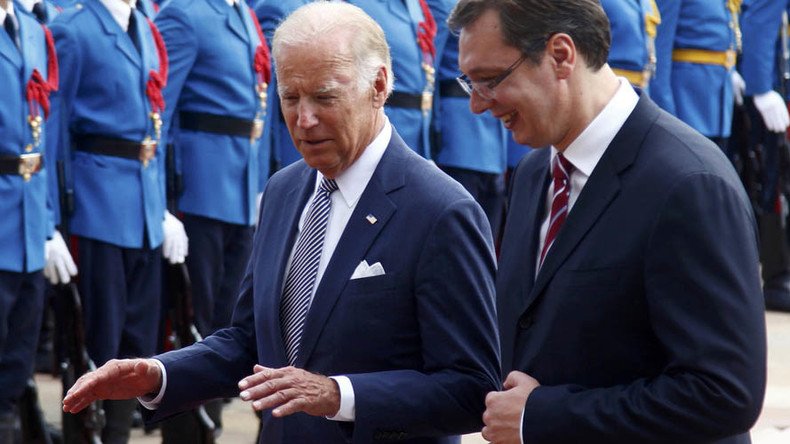‘Biden praising Serbia’s European path – worrying development’

US Vice-President Joe Biden commending Serbia’s European path might effectively mean that he’s pleased with Belgrade’s policy toward capitulation on the status of Kosovo, says Srdja Trifkovic, foreign affairs editor at Chronicles Magazine.
US Vice-President Joe Biden paid a visit to Belgrade, Serbia on Tuesday. He called for “normalization” of relations between Serbia and Kosovo – its renegade province that declared independence in 2008 – which Washington and Brussels regard as a precondition for both to join the European Union.
Serbian Prime Minister Aleksandar Vucic welcomed Biden, saying that he considers the VP “a friend of Serbia” and his personal friend, as well. Biden was an outspoken advocate of US intervention against the Serbs in the 1999s, including the NATO bombing of Belgrade back in 1999.
On Wednesday, speaking in Kosovo, Biden called for “reconciliation” between Serbia and the province separate from it by US intervention, saying it’s “critical for advancing” their full integration into Europe.
Serbian PM calls top advocate of #Yugoslavia#NATO bombing Joe Biden a ‘friend of country’ https://t.co/pEky77DAd0pic.twitter.com/fDzY7i5x2y
— RT (@RT_com) August 16, 2016
RT: What your personal take on Biden’s visit to Serbia, given his statements made back in 1998 and 1999 about the country and the Balkan war?
Srdja Trifkovic: This is not Biden’s first visit to Serbia since those statements were made – he actually visited Belgrade in May, 2009. Already at that time some people were saying that it is inappropriate for him to pay the visit in the view of fact that he was collectively demonizing the Serbs as a nation in the 1990s. However, the President – that time Boris Tadic – was pursuing strongly pro-western policy, and of course the issue was not raised.
There is a continuity of this policy under the current Prime Minister, Aleksandar Vucic, who is now in his second mandate and who is insisting on the elusive European path for Serbia, which entails subservience to the wishes of both Brussels and Washington. That is why I think that it is only – as it happens, the fringe – people like Vojislav Sheshelj and the Radical Party, who actually bothered to demonstrate against Biden. Most of ordinary Serbs remember what Biden was saying, both during the wars in Bosnia and Croatia, and later during the NATO intervention in Kosovo. But ordinary Serbs have no means of airing their opinions, and the government is treating Biden as VIP of the highest possible order.
RT: Why people of Serbia and the government have different attitude towards the visit?
ST: First of all, Vucic insists that Serbia will look forward and not dwell on the past, which is exactly what American officials and diplomats have been encouraging Serbia to do. In other words, let bygones be bygones, including NATO bombing. At the same time, I believe that behind closed doors Biden was also insisting on the need for Serbia to weaken its relations with Russia in order to pursue this path of joining the EU at some indeterminate future. He also insisted on what is euphemistically known as normalizing relations between Belgrade and Pristina, which de facto means recognition. He will never say openly that the US insists on Belgrade recognizing Kosovo as an independent state. But this is the substance of his statements.
Last, but not least, let’s not forget that only a month ago the government of Prime Minister Vucic accepted two detainees from Guantanamo in Serbia as a gesture of good will to Washington. So I think to all intense and purposes Biden was arriving not to talk as equals to Vucic, but to tell him what Washington’s expectations from Belgrade in the forthcoming period are. In that context it is significant that [Russian] Prime Minister Medvedev is coming to Belgrade in the first week of September. So Serbia will be subjected to two very different sets of views on its future foreign policy and the alignments in the western Balkans.
RT: You once mentioned that Serbian officials are warmly welcoming Biden because they want to hurry their way into EU. But what has Biden to do with the EU?
ST: Biden actually said that the US has materially contributed to the opening of the two latest chapters in Serbia’s negotiations with the EU – chapters, which had been temporarily halted because of Croatia’s insistence. Washington is more than capable of pressing certain buttons, which then have their echo and reverberations in both the Balkans and in Brussels.
Secondly, Biden also said that during his brief talks with Vucic he made reference to Serbia’s standardization of arms and equipment with NATO, which is a significant statement, bearing in mind that last February Serbia signed an agreement giving NATO personnel extraterritorial de facto diplomatic immunity inside Serbia. These are all rather worrying developments. When Biden praises Serbia’s European path, he’s effectively saying that he’s pleased with Serbia’s policy of capitulating on the most important issue of all, which is the status of Kosovo.
The statements, views and opinions expressed in this column are solely those of the author and do not necessarily represent those of RT.












